Employability Skills Journal: Career Development and Reflection
VerifiedAdded on 2021/04/21
|6
|1241
|55
Journal and Reflective Writing
AI Summary
This journal entry explores the student's employability skills through self-assessment and reflection, focusing on the application of the Gallup Strengths and Johari Window theories. The student identifies their key strengths based on the Gallup test, including Relator, Harmony, Responsibility, Positivity, and Individualization, and explains how these qualities will contribute to their career aspirations. The journal also critically appraises the Gallup Strengths Theory and the Johari Window model, highlighting their significance in understanding individual strengths, weaknesses, and interpersonal relationships. The student then reflects on how they can apply these theories to their future career development, particularly in a leadership role, emphasizing the need for continuous self-improvement, communication skills, and strategic thinking. The assignment concludes with a list of relevant references that support the analysis and reflection.
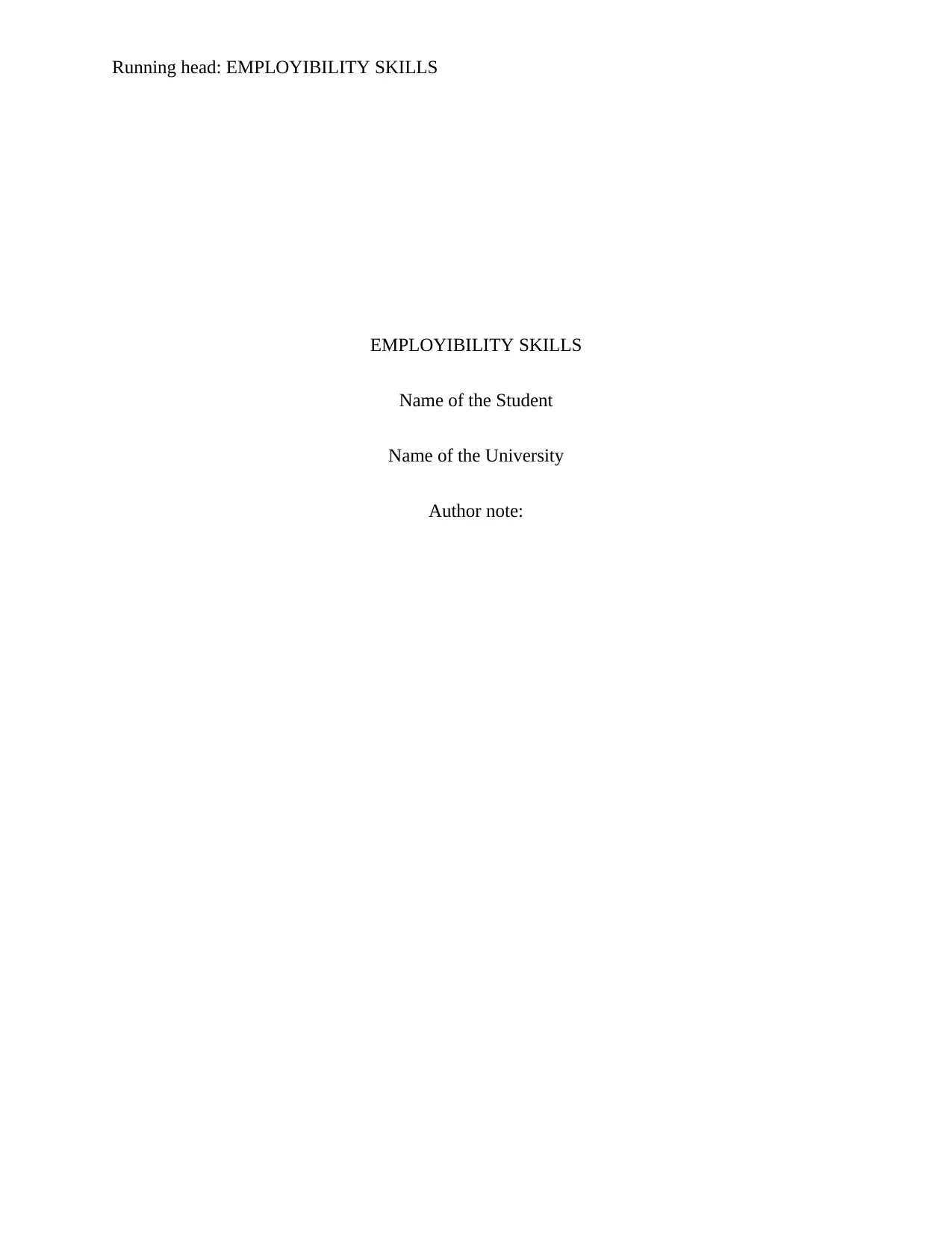
Running head: EMPLOYIBILITY SKILLS
EMPLOYIBILITY SKILLS
Name of the Student
Name of the University
Author note:
EMPLOYIBILITY SKILLS
Name of the Student
Name of the University
Author note:
Paraphrase This Document
Need a fresh take? Get an instant paraphrase of this document with our AI Paraphraser
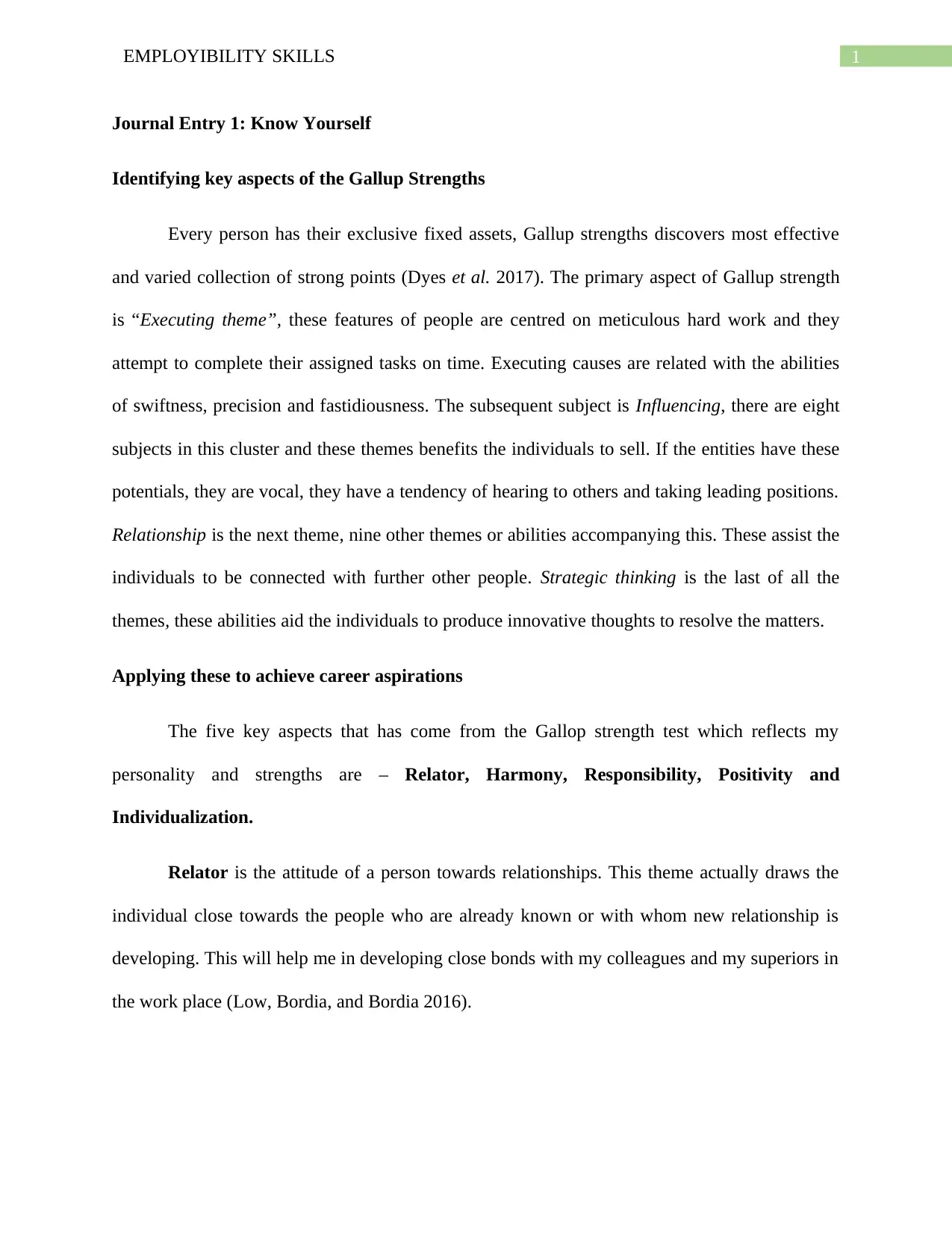
1EMPLOYIBILITY SKILLS
Journal Entry 1: Know Yourself
Identifying key aspects of the Gallup Strengths
Every person has their exclusive fixed assets, Gallup strengths discovers most effective
and varied collection of strong points (Dyes et al. 2017). The primary aspect of Gallup strength
is “Executing theme”, these features of people are centred on meticulous hard work and they
attempt to complete their assigned tasks on time. Executing causes are related with the abilities
of swiftness, precision and fastidiousness. The subsequent subject is Influencing, there are eight
subjects in this cluster and these themes benefits the individuals to sell. If the entities have these
potentials, they are vocal, they have a tendency of hearing to others and taking leading positions.
Relationship is the next theme, nine other themes or abilities accompanying this. These assist the
individuals to be connected with further other people. Strategic thinking is the last of all the
themes, these abilities aid the individuals to produce innovative thoughts to resolve the matters.
Applying these to achieve career aspirations
The five key aspects that has come from the Gallop strength test which reflects my
personality and strengths are – Relator, Harmony, Responsibility, Positivity and
Individualization.
Relator is the attitude of a person towards relationships. This theme actually draws the
individual close towards the people who are already known or with whom new relationship is
developing. This will help me in developing close bonds with my colleagues and my superiors in
the work place (Low, Bordia, and Bordia 2016).
Journal Entry 1: Know Yourself
Identifying key aspects of the Gallup Strengths
Every person has their exclusive fixed assets, Gallup strengths discovers most effective
and varied collection of strong points (Dyes et al. 2017). The primary aspect of Gallup strength
is “Executing theme”, these features of people are centred on meticulous hard work and they
attempt to complete their assigned tasks on time. Executing causes are related with the abilities
of swiftness, precision and fastidiousness. The subsequent subject is Influencing, there are eight
subjects in this cluster and these themes benefits the individuals to sell. If the entities have these
potentials, they are vocal, they have a tendency of hearing to others and taking leading positions.
Relationship is the next theme, nine other themes or abilities accompanying this. These assist the
individuals to be connected with further other people. Strategic thinking is the last of all the
themes, these abilities aid the individuals to produce innovative thoughts to resolve the matters.
Applying these to achieve career aspirations
The five key aspects that has come from the Gallop strength test which reflects my
personality and strengths are – Relator, Harmony, Responsibility, Positivity and
Individualization.
Relator is the attitude of a person towards relationships. This theme actually draws the
individual close towards the people who are already known or with whom new relationship is
developing. This will help me in developing close bonds with my colleagues and my superiors in
the work place (Low, Bordia, and Bordia 2016).
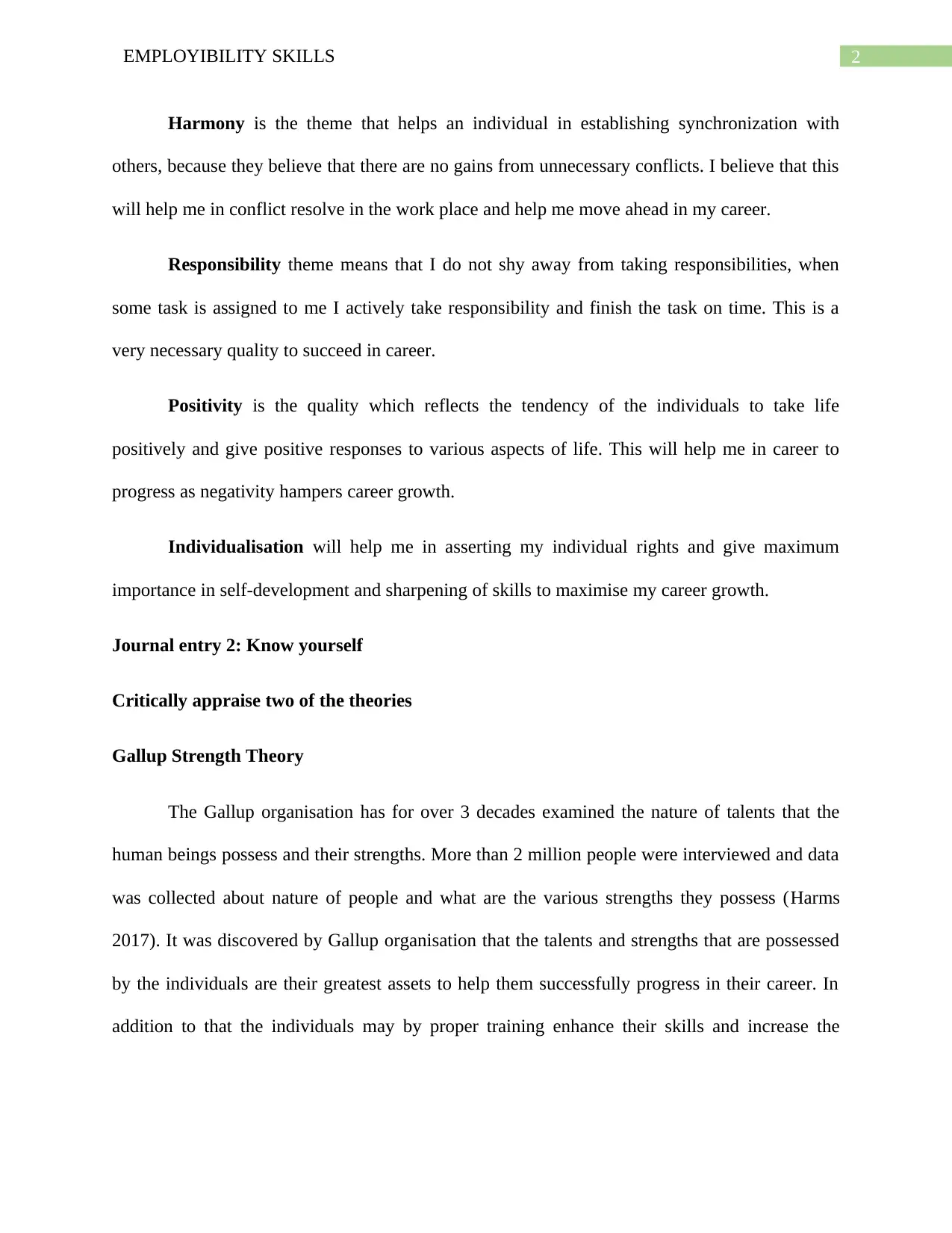
2EMPLOYIBILITY SKILLS
Harmony is the theme that helps an individual in establishing synchronization with
others, because they believe that there are no gains from unnecessary conflicts. I believe that this
will help me in conflict resolve in the work place and help me move ahead in my career.
Responsibility theme means that I do not shy away from taking responsibilities, when
some task is assigned to me I actively take responsibility and finish the task on time. This is a
very necessary quality to succeed in career.
Positivity is the quality which reflects the tendency of the individuals to take life
positively and give positive responses to various aspects of life. This will help me in career to
progress as negativity hampers career growth.
Individualisation will help me in asserting my individual rights and give maximum
importance in self-development and sharpening of skills to maximise my career growth.
Journal entry 2: Know yourself
Critically appraise two of the theories
Gallup Strength Theory
The Gallup organisation has for over 3 decades examined the nature of talents that the
human beings possess and their strengths. More than 2 million people were interviewed and data
was collected about nature of people and what are the various strengths they possess (Harms
2017). It was discovered by Gallup organisation that the talents and strengths that are possessed
by the individuals are their greatest assets to help them successfully progress in their career. In
addition to that the individuals may by proper training enhance their skills and increase the
Harmony is the theme that helps an individual in establishing synchronization with
others, because they believe that there are no gains from unnecessary conflicts. I believe that this
will help me in conflict resolve in the work place and help me move ahead in my career.
Responsibility theme means that I do not shy away from taking responsibilities, when
some task is assigned to me I actively take responsibility and finish the task on time. This is a
very necessary quality to succeed in career.
Positivity is the quality which reflects the tendency of the individuals to take life
positively and give positive responses to various aspects of life. This will help me in career to
progress as negativity hampers career growth.
Individualisation will help me in asserting my individual rights and give maximum
importance in self-development and sharpening of skills to maximise my career growth.
Journal entry 2: Know yourself
Critically appraise two of the theories
Gallup Strength Theory
The Gallup organisation has for over 3 decades examined the nature of talents that the
human beings possess and their strengths. More than 2 million people were interviewed and data
was collected about nature of people and what are the various strengths they possess (Harms
2017). It was discovered by Gallup organisation that the talents and strengths that are possessed
by the individuals are their greatest assets to help them successfully progress in their career. In
addition to that the individuals may by proper training enhance their skills and increase the
⊘ This is a preview!⊘
Do you want full access?
Subscribe today to unlock all pages.

Trusted by 1+ million students worldwide
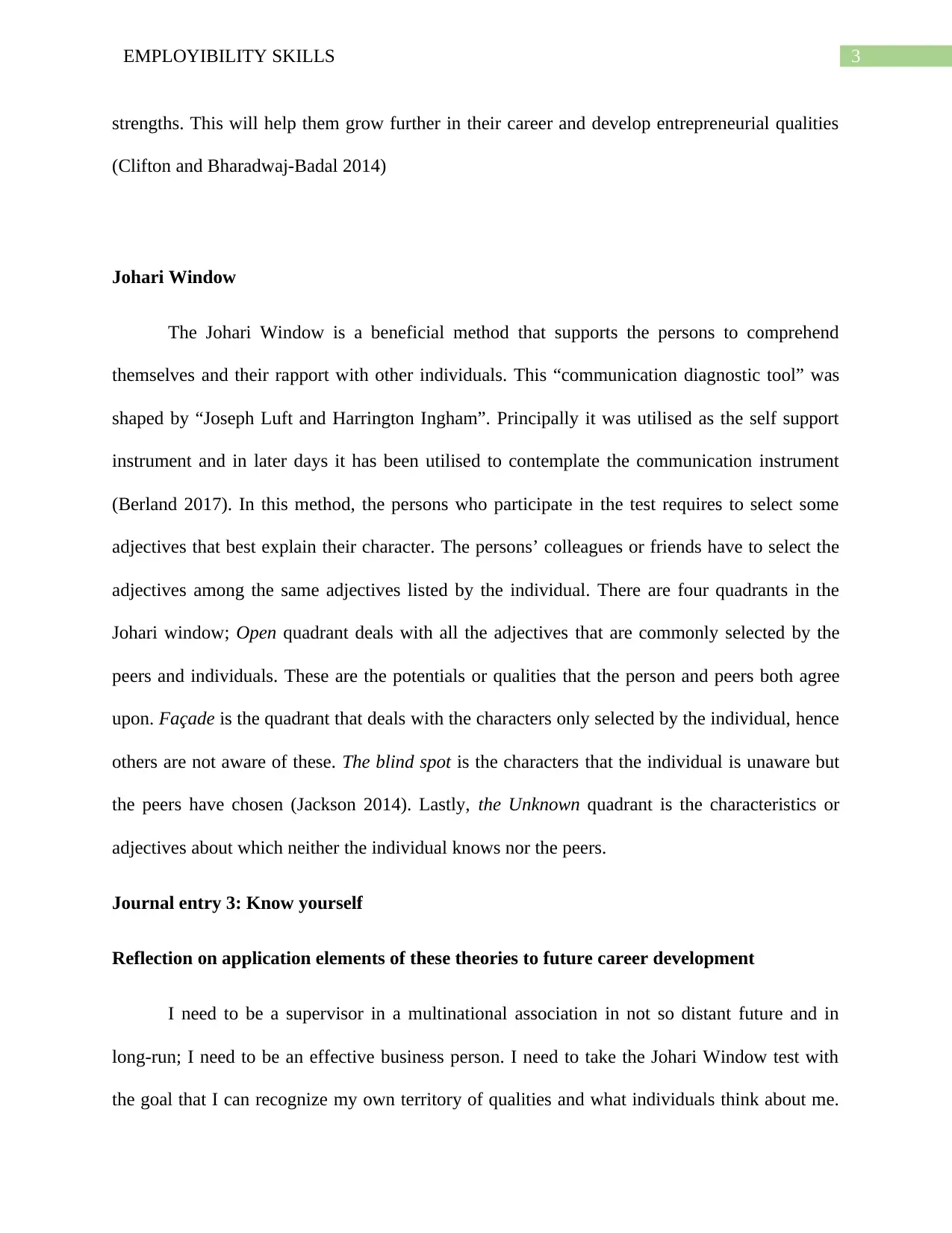
3EMPLOYIBILITY SKILLS
strengths. This will help them grow further in their career and develop entrepreneurial qualities
(Clifton and Bharadwaj-Badal 2014)
Johari Window
The Johari Window is a beneficial method that supports the persons to comprehend
themselves and their rapport with other individuals. This “communication diagnostic tool” was
shaped by “Joseph Luft and Harrington Ingham”. Principally it was utilised as the self support
instrument and in later days it has been utilised to contemplate the communication instrument
(Berland 2017). In this method, the persons who participate in the test requires to select some
adjectives that best explain their character. The persons’ colleagues or friends have to select the
adjectives among the same adjectives listed by the individual. There are four quadrants in the
Johari window; Open quadrant deals with all the adjectives that are commonly selected by the
peers and individuals. These are the potentials or qualities that the person and peers both agree
upon. Façade is the quadrant that deals with the characters only selected by the individual, hence
others are not aware of these. The blind spot is the characters that the individual is unaware but
the peers have chosen (Jackson 2014). Lastly, the Unknown quadrant is the characteristics or
adjectives about which neither the individual knows nor the peers.
Journal entry 3: Know yourself
Reflection on application elements of these theories to future career development
I need to be a supervisor in a multinational association in not so distant future and in
long-run; I need to be an effective business person. I need to take the Johari Window test with
the goal that I can recognize my own territory of qualities and what individuals think about me.
strengths. This will help them grow further in their career and develop entrepreneurial qualities
(Clifton and Bharadwaj-Badal 2014)
Johari Window
The Johari Window is a beneficial method that supports the persons to comprehend
themselves and their rapport with other individuals. This “communication diagnostic tool” was
shaped by “Joseph Luft and Harrington Ingham”. Principally it was utilised as the self support
instrument and in later days it has been utilised to contemplate the communication instrument
(Berland 2017). In this method, the persons who participate in the test requires to select some
adjectives that best explain their character. The persons’ colleagues or friends have to select the
adjectives among the same adjectives listed by the individual. There are four quadrants in the
Johari window; Open quadrant deals with all the adjectives that are commonly selected by the
peers and individuals. These are the potentials or qualities that the person and peers both agree
upon. Façade is the quadrant that deals with the characters only selected by the individual, hence
others are not aware of these. The blind spot is the characters that the individual is unaware but
the peers have chosen (Jackson 2014). Lastly, the Unknown quadrant is the characteristics or
adjectives about which neither the individual knows nor the peers.
Journal entry 3: Know yourself
Reflection on application elements of these theories to future career development
I need to be a supervisor in a multinational association in not so distant future and in
long-run; I need to be an effective business person. I need to take the Johari Window test with
the goal that I can recognize my own territory of qualities and what individuals think about me.
Paraphrase This Document
Need a fresh take? Get an instant paraphrase of this document with our AI Paraphraser
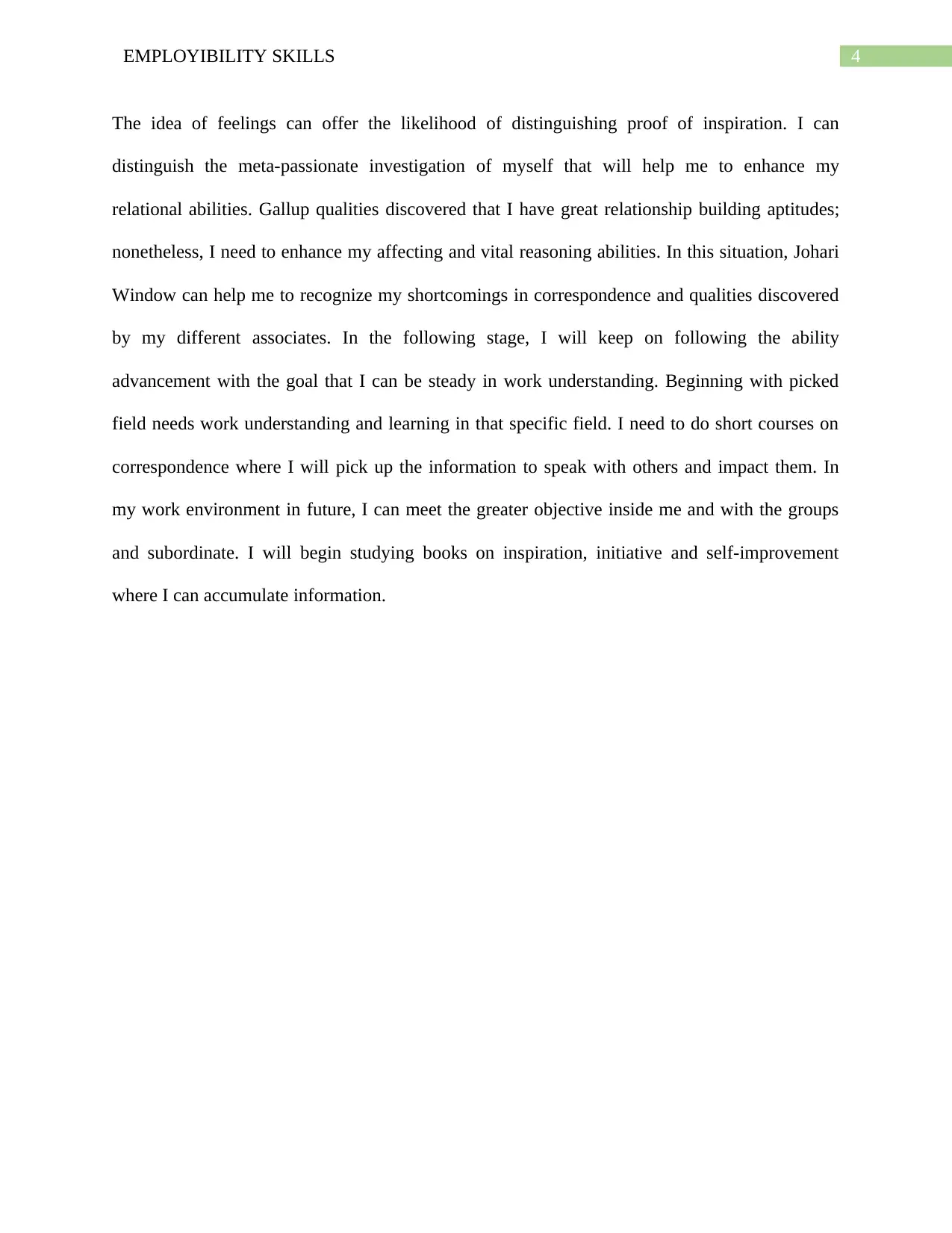
4EMPLOYIBILITY SKILLS
The idea of feelings can offer the likelihood of distinguishing proof of inspiration. I can
distinguish the meta-passionate investigation of myself that will help me to enhance my
relational abilities. Gallup qualities discovered that I have great relationship building aptitudes;
nonetheless, I need to enhance my affecting and vital reasoning abilities. In this situation, Johari
Window can help me to recognize my shortcomings in correspondence and qualities discovered
by my different associates. In the following stage, I will keep on following the ability
advancement with the goal that I can be steady in work understanding. Beginning with picked
field needs work understanding and learning in that specific field. I need to do short courses on
correspondence where I will pick up the information to speak with others and impact them. In
my work environment in future, I can meet the greater objective inside me and with the groups
and subordinate. I will begin studying books on inspiration, initiative and self-improvement
where I can accumulate information.
The idea of feelings can offer the likelihood of distinguishing proof of inspiration. I can
distinguish the meta-passionate investigation of myself that will help me to enhance my
relational abilities. Gallup qualities discovered that I have great relationship building aptitudes;
nonetheless, I need to enhance my affecting and vital reasoning abilities. In this situation, Johari
Window can help me to recognize my shortcomings in correspondence and qualities discovered
by my different associates. In the following stage, I will keep on following the ability
advancement with the goal that I can be steady in work understanding. Beginning with picked
field needs work understanding and learning in that specific field. I need to do short courses on
correspondence where I will pick up the information to speak with others and impact them. In
my work environment in future, I can meet the greater objective inside me and with the groups
and subordinate. I will begin studying books on inspiration, initiative and self-improvement
where I can accumulate information.
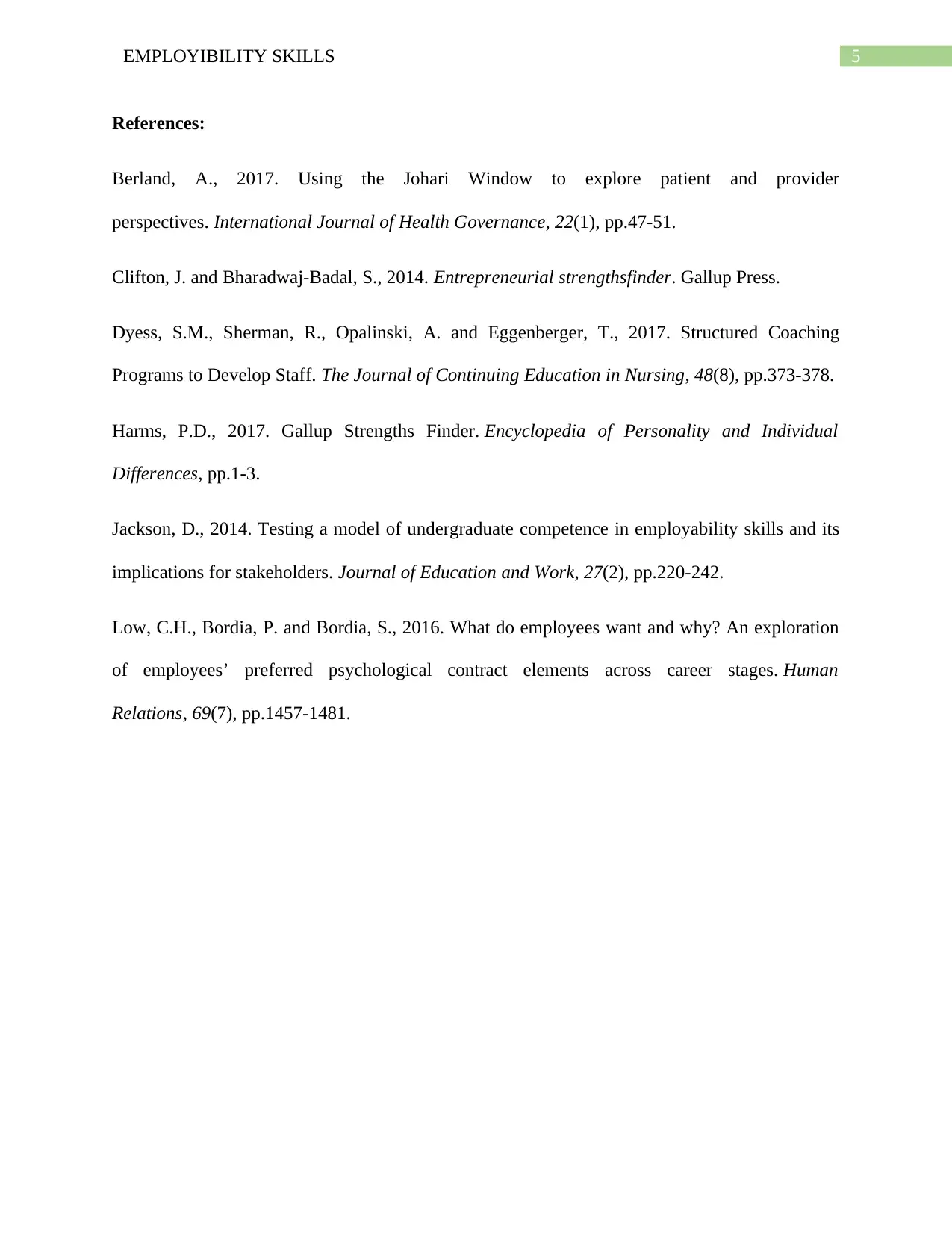
5EMPLOYIBILITY SKILLS
References:
Berland, A., 2017. Using the Johari Window to explore patient and provider
perspectives. International Journal of Health Governance, 22(1), pp.47-51.
Clifton, J. and Bharadwaj-Badal, S., 2014. Entrepreneurial strengthsfinder. Gallup Press.
Dyess, S.M., Sherman, R., Opalinski, A. and Eggenberger, T., 2017. Structured Coaching
Programs to Develop Staff. The Journal of Continuing Education in Nursing, 48(8), pp.373-378.
Harms, P.D., 2017. Gallup Strengths Finder. Encyclopedia of Personality and Individual
Differences, pp.1-3.
Jackson, D., 2014. Testing a model of undergraduate competence in employability skills and its
implications for stakeholders. Journal of Education and Work, 27(2), pp.220-242.
Low, C.H., Bordia, P. and Bordia, S., 2016. What do employees want and why? An exploration
of employees’ preferred psychological contract elements across career stages. Human
Relations, 69(7), pp.1457-1481.
References:
Berland, A., 2017. Using the Johari Window to explore patient and provider
perspectives. International Journal of Health Governance, 22(1), pp.47-51.
Clifton, J. and Bharadwaj-Badal, S., 2014. Entrepreneurial strengthsfinder. Gallup Press.
Dyess, S.M., Sherman, R., Opalinski, A. and Eggenberger, T., 2017. Structured Coaching
Programs to Develop Staff. The Journal of Continuing Education in Nursing, 48(8), pp.373-378.
Harms, P.D., 2017. Gallup Strengths Finder. Encyclopedia of Personality and Individual
Differences, pp.1-3.
Jackson, D., 2014. Testing a model of undergraduate competence in employability skills and its
implications for stakeholders. Journal of Education and Work, 27(2), pp.220-242.
Low, C.H., Bordia, P. and Bordia, S., 2016. What do employees want and why? An exploration
of employees’ preferred psychological contract elements across career stages. Human
Relations, 69(7), pp.1457-1481.
⊘ This is a preview!⊘
Do you want full access?
Subscribe today to unlock all pages.

Trusted by 1+ million students worldwide
1 out of 6
Related Documents
Your All-in-One AI-Powered Toolkit for Academic Success.
+13062052269
info@desklib.com
Available 24*7 on WhatsApp / Email
![[object Object]](/_next/static/media/star-bottom.7253800d.svg)
Unlock your academic potential
Copyright © 2020–2026 A2Z Services. All Rights Reserved. Developed and managed by ZUCOL.





